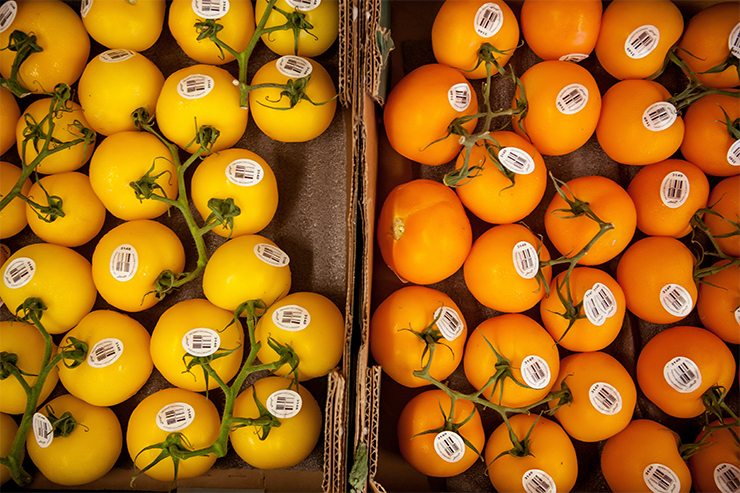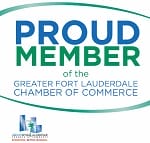By Eric Barton
Photography by Gary James
Chelsea Marando walked out to the median of Andrews Avenue on October 3, 2009, and plopped her 2-year-old son on the grass between her legs. Then she held a sign on a little strip of land in an industrial park, hoping someone would notice. “Farmers Market,” it promised.
The few people who showed up that day bought her entire stock of tomatoes and beets. The next week, many of the same people came back, their friends in tow. “Those were the best tomatoes I ever had,” one guy told Chelsea. “I’m telling my friends.”
That might not sound like much, just a few people buying tomatoes and beets, but that moment was the first good thing in years for Chelsea and her husband, Fred, who had been clobbered by the recession.
This story has a pleasant ending, though. If you’ve been to Marando Farms, then you know how huge the place has become, a place that flourishes with kale, collards, basil, cilantro, cucumbers, watermelon and squash.
Back in 2003, Fred was overseeing the interiors at the Seminole Hard Rock Hotel & Casino in Hollywood, and Chelsea found him one morning locked out of his office. It was his first day on the job site. “That can’t be good on your first day,” she said.
They got married two years later, and things were going well—they were both working construction jobs: Chelsea was as a salesperson for a supply company, and Fred was a project superintendent—until the construction market crashed in 2008. They both lost their jobs within six months of one another.
“I’m like, ‘me?’ I’m the hardest-working person you’ve ever met. How did I get laid off?” Chelsea recalls thinking. “And Fred? I’m biased, maybe, but nobody is better at his job than Fred.”
They took odd jobs at first. They dug ditches to plant trees, their baby in a backpack as they worked shovels. Their lowest point came when they took a job for a bank, cleaning up and maintaining hundreds of foreclosures. They’d find families in the homes they once owned, power cords stretched across the street. More than once, Fred just walked away, pretending he didn’t find anyone in the home.
They needed a place to store the equipment they were using to maintain the foreclosures, so they found the property where Marando Farms now sits, just southwest of the intersection of Andrews Avenue and Davie Boulevard. Weeds had taken over, and the landlord let them have a month’s rent for free just for cleaning it up. It occurred to them one day that maybe they could grow some vegetables on the property.
It made sense, considering their background. As a kid, Fred lived with his family on a farm outside Gary, Indiana, and worked nearby fields for extra money while in school. Chelsea grew up around a 100-acre farm in Springville, New York. Her grandfather raised cows, pigs, chickens and ducks, and the garden was big enough to feed their very large family and sell the extras. “That’s just how you ate,” Chelsea recalls. “Back then, I was all like, ‘Why can’t we go to McDonald’s like everybody else?’”
To open Marando Farms, Chelsea and Fred needed money they didn’t have. So they stopped paying their mortgage to fund the farm. FPL would come by the market, and they would plead with them to keep on the power—somehow it worked and they survived another couple weeks.
After the beets and tomatoes, they started looking for other sources of revenue for Marando Farms. They converted cooking oil from restaurants into biodiesel and sold it by the gallon, until federal agents came in and said it was against the law. They would buy half a cow or a pig and make sausage, until they got a notice saying they couldn’t do that either. Then they invested in a hydroponics setup and increased the capacity of their farm.
“Their story, it’s and American story. They went from being out of work to building something really fantastic.”
They started looking for other farms where they could buy quality vegetables. They’d pick up milk north of Alachua County and vegetables in Ocala. Every week, they’d make a loop around the state, filling up Fred’s pickup truck.
One day, a man walked up to Fred and told him he had tomatoes to sell. Dr. Richard Strain, an orthopedic surgeon, happened to have a farm in Davie where he grew specialty greens and heirloom tomatoes on grafted rootstock.
“I just love doing it,” Strain says. “The business supports itself, but yeah, it’s more about growing the best tomatoes anybody has ever had.”
The Marandos started selling Strain’s tomatoes, and people went crazy for them. If you know anything about organic eating or the farm-to-table trend, then you know that Chelsea and Fred had impeccable timing, opening an organic farm just as organic eating started to catch on. Not long after she was holding that sign on Andrews, the business went nuts.
Now, they have five employees and 14 interns. Every inch of the one-acre property is spoken for, including new aquaculture tanks growing fish they sell at the market. They’re even thinking about a second location. They have a full artisan market and retail store at the farm, including a fresh-pressed juice and smoothie bar and a full-variety grain-free pet store. They jar fresh honey every month. They also sell to local restaurants, including Tap 42, Valentino, Market 17, Coconuts, O-B House and 3030 Ocean.
From October to May, the main growing season in Florida, Chelsea travels to about a dozen organic farms as far as the strawberry fields on Florida’s west coast in Plant City. Now that they’re selling 300 gallons of goat- and cow-milk products every week, the dairy delivery comes to them.
People always say Fred is the more serious one, the half of the couple who thinks about the practical. Chelsea, always smiling, looks like she’s about to crack up at any moment. Together, they have a quality that just makes you want to root for them.
“Their story,” Strain says, “it’s an American story. They went from being out of work to building something really fantastic.”
Money is better, too. The Marandos unloaded their home in a short sale, and several months ago, Fred went back to work at his other profession, working for construction firm Moss & Associates. There’s a downside, though. Chelsea explains: “I miss working with my best friend beside me.”
Originally appeared in the Fall 2014 issue.







